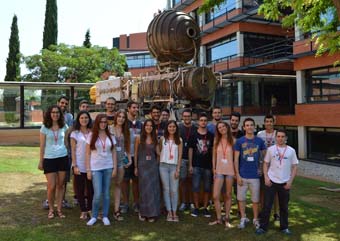
The Institute of Corpuscular Physics (IFIC, joint centre between the UV and CSIC) organises for the first time a summer school in which 20 undergraduate students in Physics in the Universitat de València will enjoy short stays in the research teams of the centre. With the help of IFIC’s tutors, students will get to know the most recent advances in the physics of the Large Hadron Collider (LHC) located in CERN, the neutrino physics, the limits of the nuclear structure and the application of these technologies with special interest in the medical physics. The course is funded by IFIC’s ‘Severo Ochoa’ programme of excellence.
The first IFIC Summer Student Programme takes place in the facilities of the Valencian Research Institute in UV’s Parc Científic from 11 to 22 July. It starts with the presentation of the 20 undergraduate students selected out of the 35 applications by virtue of their academic records and motivation. It is followed by the tutor assignment among the IFIC’s members, who will guide them along the two weeks course.
After an introduction to the Standard Model, a theory describing the elementary particles and their interactions, the programme will have presentations on the Large Hadron Collider (LHC) in CERN and the physics carried out in the experiments ATLAS, a general-purpose detector with which the Higgs boson was discovered, and LHCb, focused on the flavour physics and the study of matter-antimatter asymmetry. IFIC has an important participation in both.
The contents include a presentation on the international projects to build the next particle accelerators generation that will replace LHC, being IFIC a participant in many of them. Besides, the computer network which stores and processes the LHC data, GRID, being one of their centres located in IFIC, is shown. The section of accelerator physics ends with a visit to the centre’s laboratory where some parts of the ATLAS detector are built, together with a videoconference with the control room of the experiment, currently working with a, energy record.
Other section of the course is the neutrino physics. Students will get to know the NEXT experiment, which seeks to prove if neutrino is its own antiparticle, from the Canfranc Underground Laboratory. IFIC leads this international experiment, which is funded by European Research Council (ERC). Experiments such as T2K, which measures the neutrinos oscillation during their journey from KEK accelerator to Super-Kamiokande (Japan); and the ANTARES and KM3NeT telescopes, which detect cosmic neutrinos coming from one of the most violent phenomena of the Universe while residing under the Mediterranean Sea.
In respect of nuclear physics, the course offers an introduction to research carried out by IFIC researchers in worldwide laboratories on the nuclear structure and the limit of the stability of the nucleus, named ‘Exotic nucleus’. These studies, which required the development of instruments -designed and built in IFIC in many cases- provide valuable information for the development of nuclear astrophysics, which describes the formation of elements in the Universe, and which has also been funded by ERC for its development in IFIC. This section includes the connection with RIKEN laboratory in Japan, where a IFIC research team carries out experiments.
Another section of the course focuses on the implementation of these technologies in medical physics. The most recent advances in medical imaging technologies for the diagnosis and the hadron-therapy, which uses heavy particle such as protons instead of photons to treat various tumours, will be presented. In particular, students will be able to visit IFIMED, the new IFIC facility for research on medical physics, where research on this field will be carried out. The course concludes with the presentation of the projects carried out by the students.
More information
summer.programme.2016@ific.uv.es
http://webific.ific.uv.es/web/summer-student-programme
http://indico.ific.uv.es/indico/conferenceDisplay.py?confId=2770
Last update: 11 de july de 2016 12:49.
News release



















